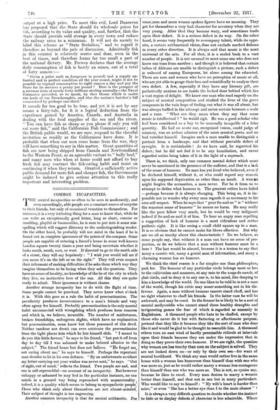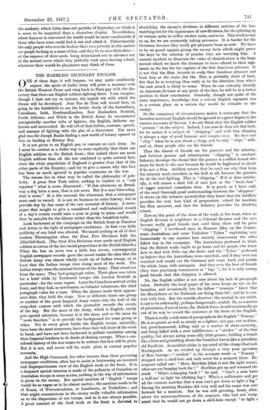COMMON INCAPACITIES.
91HE mental incapecities so often to be seen in moderately, and even exceedingly, able people are a constant source of surprise to their friends, but only of occasional vexation to themselves. For instance, it is a very irritating thing for a man to know that, while he can write an exceptionally good letter, long or short, concise or rambling, playful or businesslike, he is sure to put into it some Mk- spelling which will suggest illiteracy to the undistinguishing reader. On the other hand, he probably will not mind in the least if he is found out in complete ignorance of the points of the compass. Some people are capable of entering a friend's house in some well-known London square twenty times a year and being uncertain whether it looks north, south, east, or west. If directed to go to the north side of a street, they will say hopelessly : ",I wish you would tell me if you mean it's on the left or on the right." They will even suspect their informant of making difficulties if he asks them which way they imagine themselves to be facing when they ask the question. They have no sense of locality, no knowledge of the lie of the city in which they live, no instinctive love of the sun. All this they are quite ready to admit. Their ignorance is without shame.
Another strange incapacity has to do with the flight of time. Some people cannot be punctual. They never know what o'clock it is. With this goes as a rule the habit of procrastination. The peculiarity produces inconvenience to a man's friends and very often agony for himself. Probably procrastination is theonly mental habit unconnected with wrongdoing which produces keen remorse and which is, we believe, insurable. The number of misfortunes, broken friendships, rmforgiven slights, which have no explanation bat procrastination, none know but those possessed of this devil. Neither candour nor deceit can ever extricate the procrastinator from the tight places into which he lets himself elide. " I meant to do you this little favour," he says to his friend, " but put it off from day to day till I was ashamed to make belated allusion to the subject." The friend hears but does not believe. "Re forgot me, not caring about me," he says to himself. Perhaps the repentant man decides to lie in his own defence. " By an unfortunate accident my letter carrying out your wishes was never sent," he says. "Oat of sight, out of mind," reflects the friend. Two people are sad, and one is self-reproachful—on account of an incapacity. But however unhappy or ashamed he may feel in the particular instance, no one minds in a general. way being reproached with unpwactuality, indeed, it is a quality which seems to belong to sympathetic people; Those who think only about themselves are not absent-minded, Their subject of thought is too engrossing.
Another common incapacity is that for mental arithmetic. For
some-men and more women spoken figures have no meaning. They get fur themselves a very bad character for accuracy when they are very young. After that they become wary, and sometimes trade upon their defect. It is a serious defect in its way. On the other hand, it seems very frequently to accompany talent, while its oppo- site, a certain arithmetical vision, does not exclude marked dulness in every other direction. It is always said that music is the most universal of the arts. For all that, it is a sealed book to a vast number of people. It is not unusual to meet some one who does not know one tune from another ; and though it is believed that certain tribes of Africans are unable to distinguish a picture, such a defect is unheard of among Europeans, let alone among the educated. There are men and women who have no perception of music at all, who are yet able to gauge their loss and scientifically to analyse their own defect. A few, especially if they have any literary gift, are pathetically anxious to see inside the locked door behind which lies a vast region of delight. We know one man who read eagerly on the subject of musical composition and studied the lives of the great composers in the vain hope of finding out what it was all about, but was always baffled in the attempt and never certain between a scale and a tune. " What can they mean when they say that some music is intellectual ? " he would sigh. He was a good scholar who had been considered as a boy to be unusually incapable of a false quantity. He had an acute ear, recognized voices, could judge of mimicry, was an ardent admirer of the more musical poets, and no bad versifier himself. Imagine such a man unable to distinguish a portrait from a landscape, and that without provable defect of eyesight. It is unthinkable ! As we have said, he regretted his defeat; but he did not feel it to be any humiliation, and never regarded notice being taken of it in the light of a reproach.
There is, we think, only one common mental defect which must never be mentioned in the presence of the sufferer, and that is a lank of the sense of humour. No man has yet lived who believed, even if he declared himself, without it, or who could regard any remark upon his supposed deprivation as other than an insult. A woman might forgive the accusation, a man never. Far be it from us to attempt to define what humour is. The greatest critics have failed —perhaps because it is always changing. This being so, it is im- possible not to wonder why every man regards it as necessary to his own self-respect. When he says that " poor So-end-so " is " without the remotest sense of humour" be means no harm. He may really like the poor fellow very much, but he would be very indignant indeed if So-and-so said it of him. To hear an angry man repelling a suggestion of lack of humour is a most ridiculous and rather pathetic sight. It is like seeing a small child square up to a man. It is so obvious that he cannot make his blows effective. But why are we all so touchy about this characteristic ? Do we believe, as some people say, that without it a man can have no sense of pro- portion, or do we believe that a man without humour must be a bore ? The last would be absurd, because it is a truism to say that many a caustic wit, many a genial man of information, and many a charming woman has no humour.
We think the chief reason is a far simpler one than philosophers look for. The humour of any particular circle belongs more or less to the cultivation and manners, at any rate to the usagedumonds, of that circle, and to deny it to any one is, to his mind, like denying to him a knowledge of the world. No one likes to be told he isnot a man of the world, though his critic may M61111. something not in his dis- favour. Again, a man without.humour cannot stand chaff, and has no right whatever to chaff his friends. In the latter case he will be awkward, and may be cruel. In the former he is likely to be a sort of mental mollycoddle who cannot stand those healthy draughts and invigorating games the fear of which is regarded as unmanly in Englishmen. A thousand people who hate to be chaffed, except by those who never do it but with flattering or affectionate purpose, pretend that they like it because they like the sort of MILD who does like it and would be glad to be thought to resemble him. A thousand others turn an east wind of hardly permissible ridicule at intervals upon their friends because they are under the impression that in doing so they prove their own humour. If we are right, the question why women are lees touchy than men on the subject is solved. They are not looked down on—or only by their own sex—for want of mental hardihood. We think any man would rather live in the same house with a woman less humorous than himself than with one who was more so, just as he would rather marry a woman less courageous than himself than one who was more so. This is not, as cynics say, because he likes to excel. Every man desires to marry a woman better than himself, and that not in one but in many particulars. Who would like to say to himself " My wife's heart is harder than mine," or even " She has a better eye than Ito the main chance " ?
It is always a very difficult question to decide whether the instinct to hide or to display defeota of character is less admirable. Where the modesty which hides does not partake of hypocrisy, we think it is more to be respected than a shameless display. Nevertheless, where humour is concerned the world would be more comfortable if those who have none could find it out and admit it. Unfortunately the only people who ever do declare their own poverty in this matter are people lacking in a sense of fun, and they lie to save their skins— at the expense of their souls, being determined not to advance out of the mental cover which they probably took upon leaving school, whatever their would-be playmates may think of them.



























 Previous page
Previous page